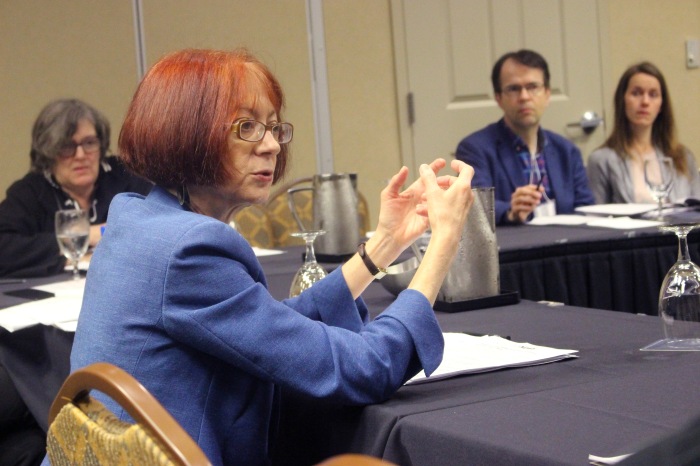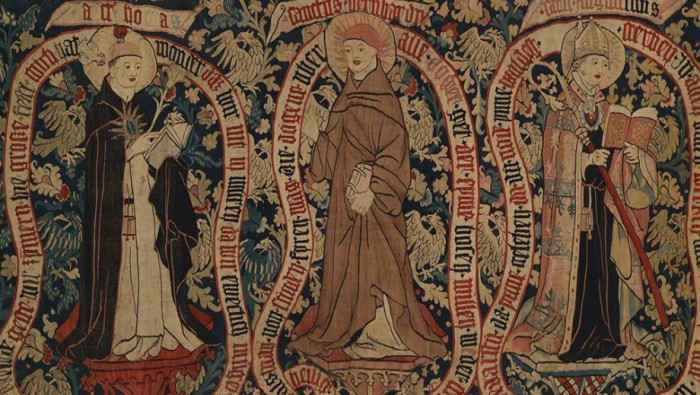
General Justice and the Common Good



Moral theologian Jean Porter (University of Notre Dame) will give the talk “What should we fear? Courage and cowardice in public life” on Monday, June 5, 2017 at 7pm in the Swift Hall 3rd Floor Lecture Hall at the University of Chicago. An audience Q & A will be followed by a reception in the Swift Hall Common Room. This talk is free and open to the public. Registration is required.
The talk and Q&A will be live-streamed at 7pm central time. For more information and to RSVP, go to https://virtue.uchicago.edu/porter
Amichai Amit is a PhD student in philosophy at the University of Chicago and a graduate assistant for Virtue, Happiness, & the Meaning of Life.


This article originally appeared in Tableau, the Division of the Humanities at the University of Chicago’s quarterly publication, as Being Well | Want a more fulfilling life? Put down your phone and look another human being in the eye by Courtney Guerra.
It’s easy to ignore the sign-offs at the end of email correspondence—they’re essentially content-neutral beyond conveying “message over.” But Candace Vogler, David B. and Clara E. Stern Professor in Philosophy, has a different style. She ends nearly all of her emails with “be well,” and, after talking with her, you get the sense that it’s intended as an actual imperative—albeit a kind and hopeful one.
It’s a small, subtle habit, but that’s the point. If you’re seeking to live more meaningfully, you might as well begin by imbuing meaning into the tiniest gestures of your everyday life.
As coleader of the Virtue, Happiness, and the Meaning of Life project, Vogler is an expert on living meaningfully. She and her collaborators study universal issues: “questions about the relations between being a good person and enjoying your life or having happiness, and having a sense of meaning or purpose,” she says. “We want to think about what it takes for those to line up.” And because the issues are universal, she’s eager to share the project’s work beyond the academy (through a blog, a podcast, a lecture series, and a culminating conference open to all).
The alignment of a satisfying and virtuous life, in her view, begins with self-transcendence: “You’ve got to see your life as enabling you to participate in a good that’s larger than you.” She’s not necessarily talking about volunteerism or devotion to a low-paying, labor-of-love type career. “I mean even in most business settings,” she says, “you’re usually working on a team of one sort or another—and in most sectors of the economy that I know anything about, if things aren’t going well on the team, work isn’t going well.” In essence: we’re all in this together, and we’ll all be better off if we keep that more readily in mind.
This point seems especially crucial as so many personal interactions are mediated through technology. “I’m really glad I’m too old to have grown up in a world where there were hundreds and hundreds and hundreds of images of me available this way and any time,” Vogler reflects. “Because it really does put us in a kind of Rousseau world, where we need everything out there to mirror back to us all the time.” She posits that in our post-smartphone reality, a “particular sense of anxiety, tenuousness, and weirdly overpublicized isolation” results from “not having learned many skills about how to connect with other human beings. And it is something you have to learn to do.”
While insecurity and awkwardness aren’t newly emergent phenomena, she thinks they’ve gotten worse. “The depth of the hunger to be connected to other people—that doesn’t change. The thought that you might be able to do that at 4 o’clock in the morning on the phone, that’s different. That’s a new thing.”
Vogler doesn’t dispute the utility of screen-based communications in certain contexts, but warns against letting them replace face-to-face interactions. Something as simple as saying hello to other people can “reassure your whole body that you’re in a world with fellow human beings”—fulfilling a fundamental animal need and offering a brief respite from whatever obligations you’re running to and from. If you’re chronically overscheduled, Vogler urges, that means “you’re too busy not to stop and say ‘good morning.’ If you’re that busy, it’s critically important that you do these things that don’t actually cost very much time at all.”
What’s her prescription for achieving a more meaningful life? “Greet people. You start with things like that. Notice that you’re in a human environment, that there are other people around, that you’re a member of a community that’s doing various things. Slowly, gently, in a friendly way, acknowledge them. That kind of little thing could be enough to make a huge difference.”

This article originally appeared in Tableau, the Division of the Humanities at the University of Chicago’s quarterly publication, as Scholarship of Self-Transcendence: Candace Vogler leads a search for the meaning of life by Courtney C. W. Guerra.
Candace Vogler, the David B. and Clara E. Stern Professor in Philosophy, is invested in her fellow human beings, and she’s determined to help them—us—find fulfillment. To tackle such a complex issue, she proposed the collaborative research project Virtue, Happiness, and the Meaning of Life, the aims of which are every bit as ambitious as its name implies. With major support from the John Templeton Foundation, this multiyear initiative—jointly led by Jennifer A. Frey, a philosopher at the University of South Carolina—explores self-transcendence: a feeling of connection to something beyond the individual self.
Of course, there’s no single way for human beings to attain self-transcendence: it can happen through spiritual practice, professional drive, familial bonds, or any number of commitments to a higher cause. Vogler’s group includes psychologists, philosophers, and religious thinkers from a variety of traditions. Many are UChicago colleagues: assistant professor Marc G. Berman and professor Howard C. Nusbaum in Psychology, associate professor Tahera Qutbuddin in Near Eastern Languages and Civilizations, and, in Philosophy, assistant professor Matthias Haase and Josef Stern, the William H. Colvin Professor Emeritus. The 30-scholar cohort represents institutions throughout the United States, Middle East, and Europe; they have been meeting and teaching since October 2015.
When she devised the project, Vogler says, “The ambition was to get a kind of deep integration between people working in very different disciplines” without relegating their work to the margins of less widely read, explicitly interdisciplinary publications. And it worked: the participants are “doing disciplinary work, they’re publishing in the disciplinary journals, and the inspiration for it is coming out of the frame of the project.”
These discussions have informed 10 published or forthcoming articles—a figure that “pretty dramatically exceeded” her initial expectations—with many more on the way. One essay that encapsulates the spirit of the project is being developed by Notre Dame theologian Jean Porter, about studies by Cornell University psychologist Katherine Kinzler on early childhood food preferences. Porter finds parallels between contemporary psychology and the views of Catholic philosopher Thomas Aquinas on the influence of group identity on what children choose to eat. (A draft is available on the Virtue Blog, along with other writings and filmed lectures.) This video helps to introduce and contextualize the group’s scholarship.
Like Porter’s essay, much of the project is “built on things that ought to be super interesting to people who are not academics,” says Vogler. She hopes a broad audience will attend the culminating conference at UChicago over the weekend of October 14–15. From there, Vogler plans to share her team’s findings with educators—from early childhood through MBA programs and beyond—to help promote self-transcendence at every stage of development. “There’s a big difference,” she points out, “between leading a life that’s super busy and leading a life that’s full.” Her hope is that the group’s work, as it reverberates out into the broader world, will help people achieve the latter.

Moral theologian Jean Porter (University of Notre Dame) will give the talk “What should we fear? Courage and cowardice in public life” on Monday, June 5, 2017 at 7pm in the Swift Hall 3rd Floor Lecture Hall at the University of Chicago. An audience Q & A will be followed by a reception in the Swift Hall Common Room. This talk is free and open to the public. Registration is required.
The talk and Q&A will be live-streamed at 7pm central time. For more information and to RSVP, go to https://virtue.uchicago.edu/porter
Here is the abstract for her talk:
Courage is pre-eminently an individual virtue. Yet we can also describe a community or a nation as courageous in its response to a threat or an attack. To take one well-known example, the behavior and attitudes of the English during the Blitz of 1940-41 offers an outstanding example of collective public courage. Somewhat to the surprise of government officials, the civilians subjected to intensive German bombing were not only relatively free of trauma, they were able to carry on with their lives, and even to be cheerful in the face of repeated attacks. The collective courage of the English under the Blitz was of course dependent on the courage of countless individuals, and yet it cannot be reduced to the sum of so many courageous acts and lives. The government promoted, and individuals cooperated in creating a set of practices and expectations that encouraged bravery and perseverance. At this point, England was a brave society, which both drew its courage from individuals and communicated it back to them.In my remarks this evening, I want to examine another example of public courage and public cowardice, which began to develop within the memory of many of us and is still unfolding today. I am referring to public reactions to the threat of terrorism since the attacks of 9/11. During and immediately after the attacks themselves, the men and women at the scene, together with the police, fire fighters, and medical personnel, behaved with exemplary bravery in the face of an unimaginable danger. These clear, unambiguous examples of courage do not call for extended analysis. However, at another level, public reactions to the threat of terrorist attacks present a more complex and ambiguous example. I want to suggest that we as a nation responded initially to terrorist assaults and the threat of further attacks with another kind of courage, not physical bravery but a firm resolve to hold onto central values, including equality, tolerance, and respect for the rule of law. However, over the past fifteen years, our attitudes as a civic society, as expressed by the actions taken in our name, reflect a growing unwillingness to live with risk and, correspondingly, a willingness to do almost anything to our supposed enemies, in order to secure our own safety. In other words, we as a nation have moved from courage to a kind of cowardice when it comes to our attitudes towards these threats. I will consider some of the possible causes of this development, and suggest some ways in which we might reclaim our initial courage.

We’re presenting a short series of abstracts of the work-in-progress our scholars will present and discuss at their June 2017 Working Group Meeting. Heather C. Lench is Associate Professor and Associate Head in the Department of Psychology at Texas A&M University and scholar with Virtue, Happiness, & the Meaning of Life.
People try to make decisions that will improve their lives and make them happy, and to do so, they rely on affective forecasts–predictions about how future outcomes will make them feel. The greater the emotional impact people expect a future outcome to have, the more effort and resources they invest in attaining or avoiding it. Understandably then, inaccuracy in affective forecasting has been identified as a major obstacle to making good decisions. Decades of research suggest that people are poor at predicting how they will feel and commonly overestimate the impact that future events will have on their emotions. Although the simplicity of this idea is intuitively attractive, recent studies have revealed that people are actually very good at forecasting some features of their emotional reaction. This investigation tested a new theoretical model that explains past inconsistent results demonstrating that sometimes people overestimate, sometimes underestimate, and are sometimes accurate in their forecasts. The investigation clearly differentiates forecasts of emotional intensity, frequency, and duration for the first time in the real-world setting of a controversial presidential election. Participants accurately forecast the intensity of their reaction, but overestimated how frequently they would feel emotions about the election and how much their mood would be impacted by the election. Consistent with our theoretical model, bias in forecasts of emotion were predicted by cognitive features. Overestimating the importance of the election resulted in overestimating the intensity of responses; overestimating the frequency of thinking about the election resulted in overestimating the frequency of responses; and overestimating the relevance of the election to personal goals predicted overestimating the impact of the election on mood. By allowing researchers to achieve greater precision about the features of emotion being predicted, this study clarifies when and why people overestimate, underestimate, and accurately predict their emotional reactions. Addressing this question is essential, not only for a theoretical understanding of how people think about their futures, but also for understanding how to intervene to improve decisions.
The results inform interventions designed to improve decision-making in applied domains including health, public policy, education, and economics. People making important decisions–such as whether to undergo surgery, listen to public health warnings, or pursue a specific career– will be better informed if they can accurately predict how the outcomes of their decisions will make them feel. Thus, interventions that improve forecasting are critically important for helping people make informed choices with implications for the length and quality of their lives.
*This is a collaborative project with Linda J. Levine, and is funded by the National Science Foundation (#1451297)
*A similar abstract was submitted for the December 2016 meeting; however, discussion of these primary findings was delayed in favor of presenting several serendipitous results given the surprising outcome of the election.

We’re presenting a short series of abstracts of the work-in-progress our scholars will present and discuss at their June 2017 Working Group Meeting.
Tahera Qutbuddin is Associate Professor of Arabic Literature at the University of Chicago.
1. Chapter on “The Sermon of Pious Counsel,” from my monograph project currently underway titled Classical Arabic Oratory: Religion, Politics and Oral Aesthetics of Public Address in the Early Islamic World.
Abstract: Showcasing a unique outlook on the purpose of human life in the early Islamic world of the seventh and eighth centuries, the sermon of pious counsel was one of the four major types of Arabic oration. Rooted in the pre-Islamic desert-dweller’s deep consciousness of cosmic cycles and human mortality, it was channeled toward priming for the afterlife by the monotheistic vision of Muhammad and the Qurʾan. Pious counsel also permeated the other three categories: Friday sermons were an obvious repository of devotional material, but battle speeches and political orations were also frequently framed in a pietistic vein. The orator concentrated on reminding his audience of the inevitability of death, the necessity of leading a pious and principled life preparing for an imminent hereafter, and remaining at all times conscious of God. The chapter I am submitting for our Workshop examines these key themes and their religious and ethical subthemes with copious textual examples. In addition, it outlines the sermon’s historical development, formulae and patterns, and briefly describes concurrent non-oratorical genres of pious counsel. It ends with the text, translation and analysis of an illustrative sermon attributed to a commander of the Kharijite “Seceders,” Qatari ibn al-Fujaʾah (d. ca. 698).
2. Short paper titled “Imam Ali’s Preaching of Peace and Pluralism: Five Categories of Exhortations to Justice, Equity and Compassion from The Path of Eloquence (Nahj al-balaghah) and A Treasury of Virtues (Dustur maʿalim al-hikam )”—expanded write-up from presentation originally prepared for UNESCO World Philosophy Day, 2014, Paris, at a conference titled: The Contribution of Ali ibn Abi Talib’s Thought to a Culture of Peace & Intercultural Dialogue.
Abstract: Imam Ali ibn Abi Talib’s (d. 661) strong advocacy of peace and pluralism is well known and works on multiple levels of individual, society and state. In this paper, I present five broad categories of these early Islamic teachings through a selection of Ali’s sayings, sermons, letters and verse: (1) seeking justice and abstaining from vengeance; (2) pluralism; (3) focus on the hereafter, not worldly gain; (4) personal ethics: respect and sanctity of living creatures; and (5) the role of government.